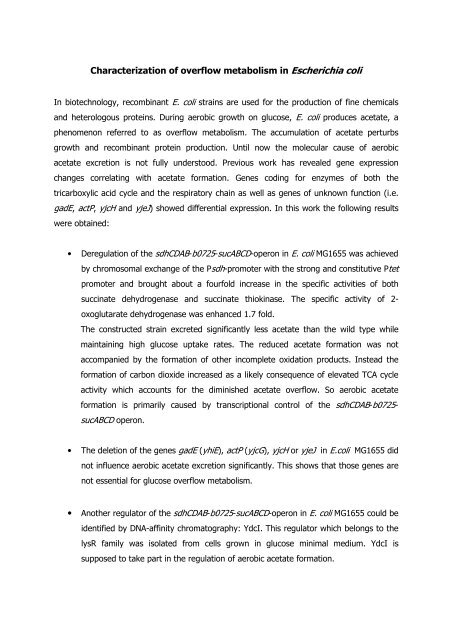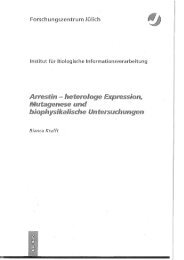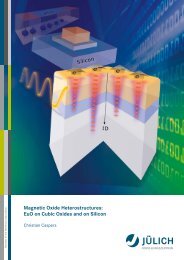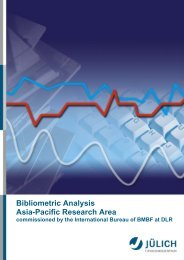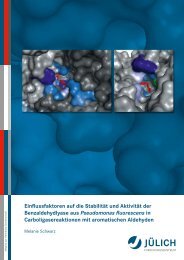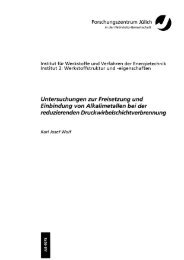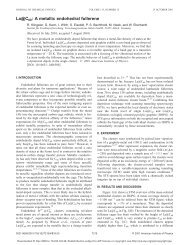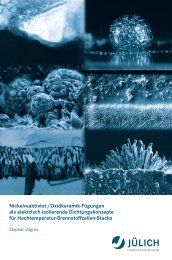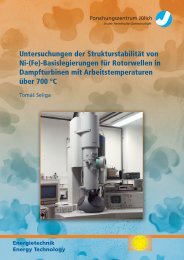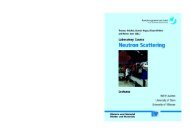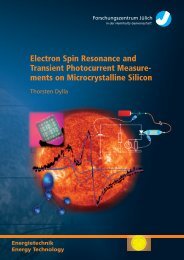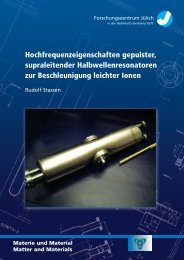Untersuchungen zum Überflussmetabolismus in Escherichia coli
Untersuchungen zum Überflussmetabolismus in Escherichia coli
Untersuchungen zum Überflussmetabolismus in Escherichia coli
Erfolgreiche ePaper selbst erstellen
Machen Sie aus Ihren PDF Publikationen ein blätterbares Flipbook mit unserer einzigartigen Google optimierten e-Paper Software.
Characterization of overflow metabolism <strong>in</strong> <strong>Escherichia</strong> <strong>coli</strong><br />
In biotechnology, recomb<strong>in</strong>ant E. <strong>coli</strong> stra<strong>in</strong>s are used for the production of f<strong>in</strong>e chemicals<br />
and heterologous prote<strong>in</strong>s. Dur<strong>in</strong>g aerobic growth on glucose, E. <strong>coli</strong> produces acetate, a<br />
phenomenon referred to as overflow metabolism. The accumulation of acetate perturbs<br />
growth and recomb<strong>in</strong>ant prote<strong>in</strong> production. Until now the molecular cause of aerobic<br />
acetate excretion is not fully understood. Previous work has revealed gene expression<br />
changes correlat<strong>in</strong>g with acetate formation. Genes cod<strong>in</strong>g for enzymes of both the<br />
tricarboxylic acid cycle and the respiratory cha<strong>in</strong> as well as genes of unknown function (i.e.<br />
gadE, actP, yjcH and yjeJ) showed differential expression. In this work the follow<strong>in</strong>g results<br />
were obta<strong>in</strong>ed:<br />
• Deregulation of the sdhCDAB-b0725-sucABCD-operon <strong>in</strong> E. <strong>coli</strong> MG1655 was achieved<br />
by chromosomal exchange of the Psdh-promoter with the strong and constitutive Ptet<br />
promoter and brought about a fourfold <strong>in</strong>crease <strong>in</strong> the specific activities of both<br />
succ<strong>in</strong>ate dehydrogenase and succ<strong>in</strong>ate thiok<strong>in</strong>ase. The specific activity of 2-<br />
oxoglutarate dehydrogenase was enhanced 1.7 fold.<br />
The constructed stra<strong>in</strong> excreted significantly less acetate than the wild type while<br />
ma<strong>in</strong>ta<strong>in</strong><strong>in</strong>g high glucose uptake rates. The reduced acetate formation was not<br />
accompanied by the formation of other <strong>in</strong>complete oxidation products. Instead the<br />
formation of carbon dioxide <strong>in</strong>creased as a likely consequence of elevated TCA cycle<br />
activity which accounts for the dim<strong>in</strong>ished acetate overflow. So aerobic acetate<br />
formation is primarily caused by transcriptional control of the sdhCDAB-b0725-<br />
sucABCD operon.<br />
• The deletion of the genes gadE (yhiE), actP (yjcG), yjcH or yjeJ <strong>in</strong> E.<strong>coli</strong> MG1655 did<br />
not <strong>in</strong>fluence aerobic acetate excretion significantly. This shows that those genes are<br />
not essential for glucose overflow metabolism.<br />
• Another regulator of the sdhCDAB-b0725-sucABCD-operon <strong>in</strong> E. <strong>coli</strong> MG1655 could be<br />
identified by DNA-aff<strong>in</strong>ity chromatography: YdcI. This regulator which belongs to the<br />
lysR family was isolated from cells grown <strong>in</strong> glucose m<strong>in</strong>imal medium. YdcI is<br />
supposed to take part <strong>in</strong> the regulation of aerobic acetate formation.


